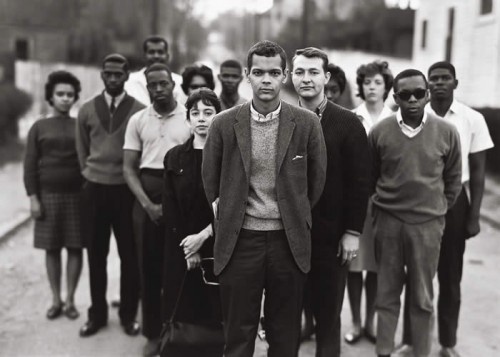VOICES: Julian Bond, an American revolutionary

Julian Bond, co-founder of the Institute for Southern Studies, pictured (center) with other members of the Student Nonviolent Coordinating Committee in the early 1960s. (Photo: Richard Avedon Foundation.)
Julian was 14 when nine white men in black robes declared Plessy
Young Julian's political analysis, his serious demeanor, his understanding of white-black Southern history, and his command of English quickly won him the job of SNCC's communication director. Thousands of news releases and political analyses flowed from the SNCC office in Atlanta. Since its field secretaries were continually being arrested, beaten up, and threatened with death, and they had sworn to forego the right to self-defense, Bond's ability to alert national television and print media to where people were being attacked probably saved many SNCC activists and grassroots leaders.
When black soldiers came home from from Vietnam describing the atrocities they had seen the U.S. commit against the tiny country's non-white peasants, it was not long for Julian and SNCC to begin protesting these atrocities. Soon the Georgia legislature, dripping with the money being spent by the U.S. military across Georgia, decided Bond's truth-telling could not be tolerated in the legislature and ejected him from his hard-won seat.
Without skipping a beat, Julian and SNCC took the attack on him as an opportunity for turning the Southern U.S. anti-racism movement into a Southern hemisphere movement against the racist policies of the U.S. and European nations toward native non-whites. With brilliant organizing and media work, complemented by a good legal strategy, the Supreme Court forced the legislature to seat one of the youngest state representatives in the country.
Americans are the targets of a conscious dumbing down by Tea Party extremists, who are dependent on their twisted versions of world events and history. Their cruel policies would be immediately rejected if our kids were taught accurate history in our public schools. This problem led to Julian's full support of the "Eyes on the Prize" [civil rights history] film. But it also makes it necessary, I believe, to preface any comments about his contributions to the anti-racism movement with a review of certain historical facts, to contextualize and provide an evidentiary foundation for the statements of praise and thanks I want to make about my beloved brother. I know Julian would have it no other way.
After the Second Reconstruction was short-circuited by the Wallace-Nixon-Helms-Rehnquist Southern Strategy, Brother Bond, in 1998, was persuaded to lead 64 civil rights veterans who sit on the board of directors of the National Association for the Advancement of Colored People. Julian Bond never let us down in our efforts in North Carolina to revive SNCC's strategy of non-violent direct action from the moral high ground. He gave us confidence to experiment with different ways to welcome our brown and white sisters and brothers to the central struggle against racism. Yes, the "Black Power" slogan and its underlying theory was popularized by SNCC in 1966. But we knew it had been vulgarized by hostile national forces and media, and that SNCC itself always supported white allies, friends, and close comrades within the anti-racism movement.
In 2006 we began building the Historic Thousands on Jones Street Coalition and Julian attended several of these annual People's Assemblies. He encouraged our state conference to transform our once a year actions at the People's House into once a week actions, which the media called Moral Mondays.
Now, Brother Julian, you get a well-deserved rest. You join the nine Emanuel Martyrs in the cloud of witnesses. We will keep alive your love, your humor, and your direct way of promoting justice, as we continue the Long March. You will be present within us as we walk in the NAACP's Journey for Justice through North Carolina on the way to D.C. to demand a comprehensive Voting Rights Act, that five justices — liquidating history — eviscerated a couple of years ago.
As the Journey passes ALEC's [American Legislative Exchange Committee] offices in Northern Virginia, a factory of poisonous boiler-plates of cruel laws for Southern states to pass against the poor, disenfranchised, poorly schooled, LGBTQ, labor, immigrants, women, and every group of people excluded from accumulating capital in the avaricious economic-political system that is playing its trump card once again, you will be with us.
We can hear you saying from the clouds: AMERICA. Shuffle the letters and you get: I AM RACE. Chairperson Bond ... you are present. Julian ... Presente.
(Rev. Dr. William Barber II is president of the North Carolina Conference of the NAACP and leader of the Moral Monday movement.)
Tags
Rev. Dr. William J. Barber II
Rev. Dr. William J. Barber II is the president of the North Carolina NAACP and architect of the Forward Together Moral Movement.
